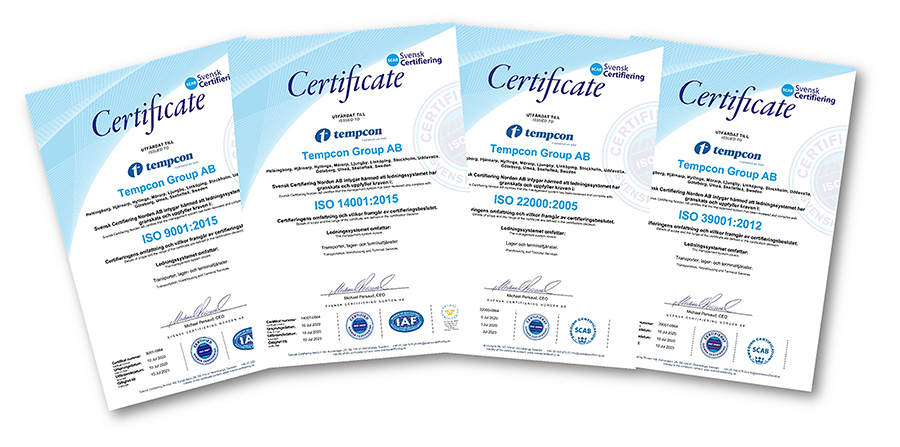Since 2020, Tempcon has had the industry’s sharpest management system and we still hold the position. The recent review of the Group’s Multisite Certificate by Svensk Certifiering Norden AB shows that the Group and its subsidiaries continue to maintain a high level of work. There are many employees around the country who spend countless working hours maintaining and being responsible for ensuring that day-to-day operations follow the management system.
For Tempcon Group, it has been a natural and obvious step to become certified, as the requirements for certification exist from many customers, while at the same time signaling credibility in the offer we have for the market. The Group and all subsidiaries are today certified against management systems for quality (ISO 9001), environment (ISO 14001), traffic safety (ISO 39001) and food safety (ISO 22000). We also work according to the principles of ISO 26000 (social responsibility) and ISO 27001 (information security).
What is important to remember is that a management system should lead to business benefits. It will help management to better manage and follow up their operations. It is also important that the management system becomes an integral part of the daily operations, while at the same time working on continuous improvements. A management system is always under development.
ISO 9001 is a standard for quality management for business processes in the company. A quality management system describes how you constantly improve and adjust your business to meet customer needs. ISO 9001 is based on 7 principles; customer focus, leadership, employee engagement, process focus, improvement, fact-based decisions and relationship management.
ISO 14001 is an international management system standard that helps the company to focus on the right things when it comes to planning, implementation, follow-up and continuous improvement of the business’ environmental work. In turn, an environmental management system becomes a cost-effective way of conducting environmental issues and environmental work when you use your resources in the right way.
ISO 22000 is an international standard for food safety that places high demands on all stages of food handling. ISO 22000 is a support in the work for safe food through a systematic work, control and documentation. ISO 22000 focuses on management’s responsibilities and includes a common terminology which streamlines and reduces the risk of errors in order to create maximum food safety.
ISO 39001 is an international standard for work with road traffic safety. The standard can be seen as a complement to the legislation in the area with the aim of achieving a safer traffic environment. ISO 39001 covers everything from the organization’s understanding of road safety with leadership, attitudes and competence issues to factors such as vehicle maintenance, planning and measures.
ISO 26000 is an international standard for corporate social responsibility. It is based on seven basic principles that together define the concept of organizations’ social responsibility. The seven basic principles are; accountability, transparency, ethical conduct, respect for stakeholders, respect for the law, compliance with international standards of conduct and respect for human rights.
ISO 27001 is based on protecting information and since it is often digitized today, it also covers cyber security. In principle, all organizations also have information that contains personal data and therefore it also includes data protection.
